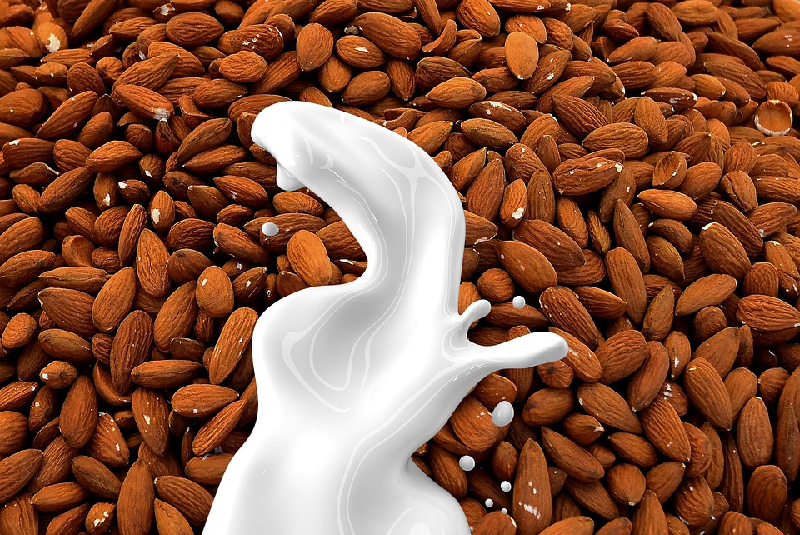Almond milk can be a fantastic alternative to dairy milk. Creamy in consistency and pleasant and nutty in taste, almond milk is a nutritious beverage you can use almost anywhere you would use cow’s milk. And it’s easy to make! Just blend organic almonds with water, and then strain the mixture to remove the solids.
Alternatively, it can be made by adding water to almond butter. Of course, you can also buy it in almost any grocery store.
Read on to learn why you should enjoy this delicious nutty beverage.

Here are 7 health benefits of almond milk:
1. It’s Nutrient-Dense
Almond milk health benefits start with its nutrients. It’s rich in several vitamins and minerals, such as vitamin E. However, much of this is lost when commercially made. (1, 2) You can buy fortified almond milk, but you can also make your own. And one of the benefits to making your own is that you can soak the almonds before turning them into milk. Doing this helps rid of the phytic acid and enzyme inhibitors, which can interfere with the function of your digestive and metabolic enzymes. (3, 4, 5, 6)
When you soak the nuts, it starts the germination process. This allows the enzyme inhibitors to be deactivated, which increases the available nutrition of the nut. Make your own batch at home to truly reap almond milk health benefits.
2. Low-Calorie and Low in Added Sugar
While almonds are high and fat and calories, commercially-produced almond milk is not. However, part of this is because the almond milk you buy in a store is mostly water. While the calories and fat might increase when you make your own almond milk, you can also control the amount of extra sugar that goes into your mixture. Store-bought almond milk often has added sugar in it. When you make it at home, however, you know exactly what is going into your milk as well as what ratios of ingredients. This is a surefire way to reap almond milk health benefits. But if you’re wanting to cut down on calories and you’re not as concerned about nutrients, commercially-made almond milk might be the way to go.
3. Won’t Raise Blood Sugar
This nutty beverage is also low-carb. Specifically, sugar-free almond milk is a low-carb beverage, and as such, it isn’t going to cause a spike in your blood sugar. It contains only 0.6% carbs (1.5 grams) per cup (7). By comparison, low-fat dairy milk has 5% carbs, which comes to a total of 12 grams in one cup. (8). This makes almond milk a good option for diabetics and those who wish to watch their blood sugar levels.
While you can buy unsweetened almond milk, making it yourself at home lets you control the added sugar content yourself. Or, if you purchase store-bought, be sure to read the label first.
4. Dairy-Free
Almond milk health benefits those who are lactose intolerant, as well, and those who do not consume animal byproducts. Undigested lactose passes down to the colon where it is fermented by the resident bacteria. This leads to symptoms such as excessive gas, bloating, diarrhea, and otherwise discomfort.
Choose almond milk or another nut-based milk to avoid these complications associated with drinking dairy.

5. Enriched Almond Milk may Strengthen your Bones
Almond milk health benefits your bones, as well. The kind that is fortified with calcium not only could be good for bone health, it’s also a viable replacement for dairy milk. One cup of commercial almond milk may contain up to 45-50% of the recommended daily intake of calcium. (9, 10). In comparison, cow’s milk may range from 28 to 31% of RDI. (3, 10).
As calcium is crucial for building and maintaining strong bones, fortified almond milk may reduce the risk of osteoporosis, a condition linked to weak bones and fractures. (11).
6. May Reduce Risk of Heart Disease
Studies show almond milk health benefits may include a reduced risk of heart disease. This is due to almonds containing healthy fats as well as being high in vitamin E. (12, 13)
Almond milk by weight is 1% oil. About 90% of that is unsaturated. (14) And oleic acid, the main fatty acid in almond oil, is associated with positive changes in blood lipids. (15)
One study examined healthy adults that ate 66 grams of almonds or almond oil every day for six weeks. Researchers found that subjects reduced their levels of bad cholesterol (LDL) by 6% and triglycerides by 14%. Furthermore, they increased their good (HDL) cholesterol by 6%. (16)
And these positive changes in the blood lipid profile are linked with a reduced risk of heart disease. (17) Furthermore, almond milk benefits continue with its high vitamin E content. It just one cup it provides around half of the RDI. (18)
And vitamin E is believed to be one of the main almond and almond milk health benefits. It protects lipids against oxidation, which reduces the levels of oxidized LDL cholesterol (a risk factor for heart disease). (19, 20).
7. Enriched Almond Milk is High in Vitamin D
There is a startling amount of people who are deficient in vitamin D. This increases risk of brittle bones, fatigue and weak muscles.
However, almond milk benefits extend to this area as well. Often, almond milk contains added vitamin D, as does dairy milk. In fact, one cup of almond milk may contain 25% of the RDI.


